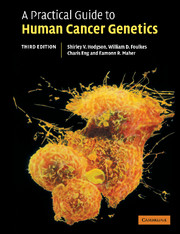1 - Genetic counselling in a familial cancer clinic
Published online by Cambridge University Press: 20 August 2009
Summary
Demand for cancer risk assessment based upon the estimation of the genetic component of cancer risk to a given individual is increasing rapidly. This is both because of increased public awareness of the genetic aspects of cancer susceptibility and as a result of requests from clinicians for evaluation of their patients so that appropriate surveillance protocols can be developed. Risk prediction in common cancers is based upon careful assessment of family history of cancer and cancerrelated syndromes, and a personal history and examination (where appropriate). The genetic risk assessment requires confirmation of the diagnosis in affected relatives whenever possible. Close links with oncologists and clinicians involved in organising surveillance are essential. Joint or multidisciplinary clinics may be appropriate in this context and, ideally, a cancer family clinic network should be developed throughout each region, province or state. Education for primary care physicians should be provided, with guidelines for appropriate referrals.
Genetic counsellors and trained genetic nurses may be increasingly employed in specialised familial cancer clinics in cancer units and primary care, with the remit of assessing empiric cancer risks on the basis of personal and family histories, and to arrange surveillance protocols (audited centrally, if possible) for individuals at moderately increased risk, reassure those at low risk, and refer those at high risk of a genetic cancer susceptibility to the Regional Genetics Centre for further evaluation, advice and management.
- Type
- Chapter
- Information
- A Practical Guide to Human Cancer Genetics , pp. 3 - 8Publisher: Cambridge University PressPrint publication year: 2006

